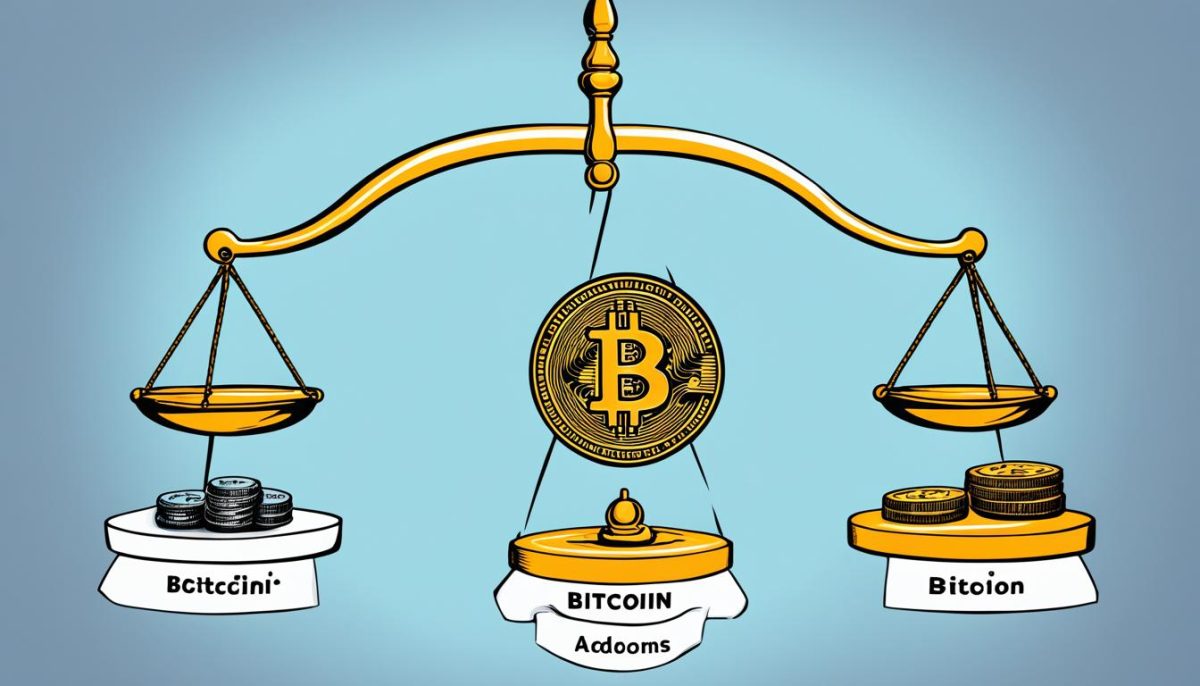As the future of finance rapidly evolves, one name has dominated the conversation: Bitcoin. This groundbreaking boom in digital currencies has sparked a fleeting frenzy among investors and financial experts alike. The question on everyone’s mind is whether Bitcoin is a game-changing innovation or simply a speculative bubble waiting to burst.
Bitcoin, the most prominent cryptocurrency, has attracted both fervent supporters and skeptical critics. Its decentralized nature and revolutionary blockchain technology have propelled it into the spotlight, promising a new era of financial freedom and transparency. However, with its volatile price fluctuations and regulatory uncertainties, many wonder if Bitcoin’s meteoric rise is sustainable or a mere illusion.
In this article, we delve into the world of Bitcoin, exploring its technology, benefits, drawbacks, and predictions for the future. Join us as we navigate the complex landscape of this digital currency and uncover the truth behind its potential as the future of finance.
Understanding Bitcoin Technology and Its Rise
Bitcoin technology has revolutionized the concept of decentralized currency. At its core, Bitcoin operates on a secure and transparent system called blockchain, which is a digital ledger that records all transactions. This blockchain technology ensures the integrity and immutability of the Bitcoin network.
One key factor that has contributed to the rise of Bitcoin is its potential for financial inclusion. Traditional banking systems often exclude individuals without access to traditional banking services. Bitcoin offers a decentralized alternative that allows anyone with an internet connection to participate in the global economy.
Furthermore, Bitcoin has gained popularity due to its perceived advantages over traditional currencies. Unlike fiat currencies that are subject to government control and manipulation, Bitcoin operates independently of any central authority. This decentralization provides individuals with financial sovereignty and protection against inflation.
The rise of Bitcoin is also closely tied to the concept of mining. Bitcoin mining involves the use of powerful computers to solve complex mathematical problems, which helps secure the Bitcoin network and validate transactions. Miners are rewarded with newly created Bitcoins for their computational efforts.
With its groundbreaking technology and potential for financial empowerment, Bitcoin has captured the attention of individuals, businesses, and investors worldwide. Its rise as a popular digital currency is a testament to the demand for a decentralized and secure monetary system.
Advantages of Bitcoin Technology and Its Rise:
- Financial inclusion for individuals without access to traditional banking services
- Decentralization and protection against inflation
- Transparent and secure blockchain technology
- Potential for global financial sovereignty
Bitcoin has the potential to disrupt traditional banking systems and reshape the future of finance. Its rise as a popular digital currency is driven by the demand for financial inclusivity, decentralization, and transparency. As we continue to delve into the world of Bitcoin, it is essential to understand its underlying technology and the impact it can have on our lives and the global economy.
Pros and Cons of Bitcoin Adoption
As Bitcoin continues to gain traction in the financial world, it is crucial to assess the pros and cons of widespread adoption. In this section, we delve into the potential benefits and concerns surrounding Bitcoin adoption.
Pros of Bitcoin Adoption
- Reduced Transaction Costs: One of the major advantages of Bitcoin adoption is the potential for reduced transaction fees. Traditional financial systems often involve intermediaries, such as banks, that charge hefty fees for transactions. Bitcoin’s decentralized nature eliminates the need for intermediaries, leading to lower costs for users.
- Increased Accessibility: Bitcoin allows individuals, especially those in underserved regions, to access financial services without relying on traditional banking infrastructure. This increased accessibility empowers people with limited access to banking services to participate in the global economy.
- Financial Independence: Bitcoin provides users with greater control over their finances. With traditional banking systems, individuals must rely on centralized authorities to manage and protect their funds. Bitcoin, on the other hand, offers a decentralized network that allows users to have full ownership and control of their digital assets.
Cons of Bitcoin Adoption
- Volatility: Bitcoin’s price volatility is a significant concern for potential adopters. The cryptocurrency market experiences frequent and substantial price fluctuations, making it a risky investment. This volatility can deter individuals and businesses from fully embracing Bitcoin as a reliable medium of exchange.
- Regulatory Challenges: The decentralized nature of Bitcoin poses regulatory challenges for governments worldwide. Regulators struggle to establish comprehensive frameworks to govern cryptocurrencies effectively. The lack of regulation can lead to uncertainty and potential risks for both businesses and consumers.
- Potential for Illegal Activities: The pseudonymous nature of Bitcoin transactions has raised concerns about its potential use in illegal activities, such as money laundering and illicit transactions. While cryptocurrencies offer various privacy advantages, they can also attract nefarious actors seeking to exploit the system.

It is essential to consider both the benefits and drawbacks when evaluating the broader adoption of Bitcoin. While the potential for reduced transaction costs, increased accessibility, and financial independence is enticing, volatility, regulatory challenges, and the potential for illegal activities remain valid concerns.
| Pros of Bitcoin Adoption | Cons of Bitcoin Adoption |
|---|---|
| Reduced transaction costs | Volatility |
| Increased accessibility | Regulatory challenges |
| Financial independence | Potential for illegal activities |
The Future of Bitcoin: Predictions and Challenges
As Bitcoin continues to gain momentum, industry experts and insiders offer fascinating predictions for the future of this groundbreaking cryptocurrency. Many believe that Bitcoin will play an increasingly significant role in the global financial landscape, challenging traditional banking systems and reshaping the way we conduct transactions.
One prediction is the increased involvement of institutional investors in Bitcoin. With major companies like Tesla and Square already investing in Bitcoin, it’s likely that more institutions will follow suit. This influx of institutional capital could further legitimize Bitcoin as a viable asset class and accelerate its mainstream adoption.
However, Bitcoin also faces significant challenges on its journey towards widespread acceptance. Government regulations and compliance requirements are among the key obstacles Bitcoin must overcome. Striking a balance between regulatory oversight and preserving the decentralized nature of Bitcoin poses a delicate challenge for lawmakers and regulators.
Another factor that will shape the future of Bitcoin is its potential to become a global reserve currency. Advocates argue that Bitcoin’s limited supply and borderless nature make it an ideal candidate to challenge traditional fiat currencies. However, skeptics argue that the inherent volatility of Bitcoin makes it unfit for such a role, raising questions about its long-term stability and reliability.
While the future of Bitcoin is filled with both promise and challenges, one thing remains certain: Bitcoin has revolutionized the way we think about money and finance. Whether it will ultimately be the currency of the future or face the fate of a speculative bubble is yet to be seen. As technology advances and market forces evolve, the fate of Bitcoin will continue to be closely watched by investors, industry players, and regulators alike.

